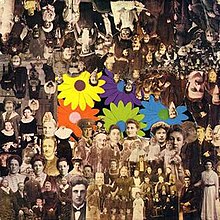
The Beatles, also referred to colloquially as the White Album, is the ninth studio album and only double album by the English rock band the Beatles, released on 22 November 1968. Featuring a plain white sleeve, the cover contains no graphics or text other than the band's name embossed. This was intended as a direct contrast to the vivid cover artwork of the band's previous LP Sgt. Pepper's Lonely Hearts Club Band. The Beatles is recognised for its fragmentary style and diverse range of genres, including folk, British blues, ska, music hall, proto-metal and the avant-garde. It has since been viewed by some critics as a postmodern work, as well as one of the greatest albums of all time.

"Paperback Writer" is a song by the English rock band the Beatles. Written primarily by Paul McCartney and credited to the Lennon–McCartney partnership, the song was released as the A-side of their eleventh single in May 1966. It topped singles charts in the United Kingdom, the United States, Ireland, West Germany, Australia, New Zealand and Norway. On the US Billboard Hot 100, the song was at number one for two non-consecutive weeks, being interrupted by Frank Sinatra's "Strangers in the Night".
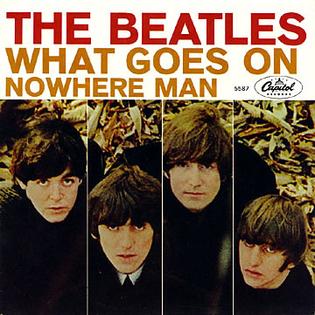
"What Goes On" is a song by the English rock band the Beatles, featured as the eighth track on their 1965 album Rubber Soul. The song was later released as the B-side of the US single "Nowhere Man", and then as the tenth track on the North America-only album Yesterday and Today. It is the only song by the band credited to Lennon–McCartney–Starkey and the only song on Rubber Soul that features Ringo Starr on lead vocals. The song reached number 81 on the US Billboard Hot 100 in 1966.

"Come Together" is a song by the English rock band the Beatles, written by John Lennon and credited to Lennon–McCartney. The song is the opening track on their 1969 album Abbey Road and was also released as a single coupled with "Something". The song reached the top of the charts in the United States and Australia, but peaked at No. 4 in the United Kingdom.

"Maxwell's Silver Hammer" is a song by the English rock band the Beatles from their 1969 album Abbey Road. It was written by Paul McCartney and credited to the Lennon–McCartney partnership. The song is about a student named Maxwell Edison who commits murders with a hammer, with the dark lyrics disguised by an upbeat sound. McCartney described the song as symbolic of the downfalls of life, being "my analogy for when something goes wrong out of the blue, as it so often does".

"Things We Said Today" is a song by the English rock band the Beatles, written by Paul McCartney and credited to Lennon–McCartney. It was released in July 1964 as the B-side to the single "A Hard Day's Night" and on their album of the same name, except in North America, where it appeared on the album Something New. The band recorded the song twice for BBC Radio and regularly performed an abbreviated version during their 1964 North American tour.

"Cry Baby Cry" is a song by the English rock band the Beatles from their 1968 double album The Beatles. It was written by John Lennon and credited to the Lennon–McCartney partnership. The coda of the song is a short segment referred to as "Can You Take Me Back", written by Paul McCartney, which was actually an outtake from the "I Will" session.

"Lovely Rita" is a song by the English rock band the Beatles from their 1967 album Sgt. Pepper's Lonely Hearts Club Band. It was written and sung by Paul McCartney and credited to Lennon–McCartney. It is about a meter maid and the narrator's affection for her.

"The Night Before" is a song by the English rock band the Beatles from their 1965 film Help! and soundtrack album of the same name. It was written primarily by Paul McCartney and credited to the Lennon–McCartney partnership. Described as a pop rock or rock and roll song, its lyrics reflect on the singer's last night with his lover before being abandoned.

"You're Going to Lose That Girl" is a song by the English rock band the Beatles from their 1965 album and film Help! Credited to the Lennon–McCartney songwriting partnership, the song was mostly written by John Lennon with contributions from Paul McCartney.
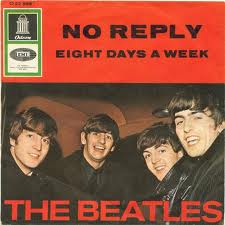
"No Reply" is a song by the English rock band the Beatles from their 1964 album Beatles for Sale. In North America, it was issued on Capitol Records' variant on the British release, Beatles '65. The song was written mainly by John Lennon and credited to Lennon–McCartney. Lennon originally gave the song to another artist managed by Brian Epstein, Tommy Quickly, in June 1964, but Quickly decided not to use it. The Beatles recorded the track in London soon after returning from their first full tour of the United States. The lyrics typify Lennon's more introspective and mature songwriting on the Beatles for Sale album.

"I'll Follow the Sun" is a song by the English rock band the Beatles. It is a ballad written and sung by Paul McCartney and credited to Lennon–McCartney. It was released in 1964 on the Beatles for Sale album in the United Kingdom and on Beatles '65 in the United States. The band played the song on the BBC program Top Gear, and the track was released on On Air – Live at the BBC Volume 2 in 2013.
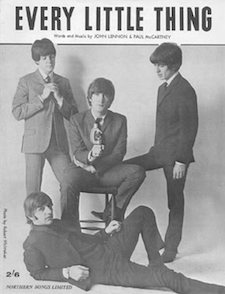
"Every Little Thing" is a song by the English rock band the Beatles from their album Beatles for Sale, issued in the UK in December 1964. Credited to Lennon–McCartney, it was written by Paul McCartney. Capitol Records first issued the song in the US on Beatles VI in June 1965. The track is an early example of the Beatles' use of non-rock instrumentation on a recording, through the addition of timpani drum over the choruses.
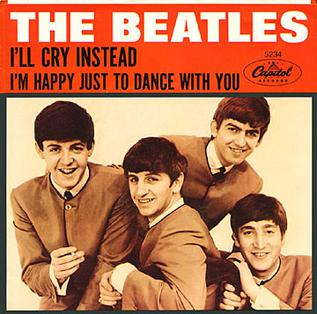
"I'll Cry Instead" is a song written by John Lennon, and recorded by the English rock band the Beatles for their third studio album, A Hard Day's Night (1964), a part-studio and part-soundtrack album to their film of the same name (1964). The song was released as a single in the US and later appeared on the album Something New in the US.

"Don't Bother Me" is a song by the English rock band the Beatles from their 1963 UK album With the Beatles. It was the first song written by George Harrison, the group's lead guitarist, to appear on one of their albums. A midtempo rock and roll song, it was originally released in the United States on the 1964 album Meet the Beatles!
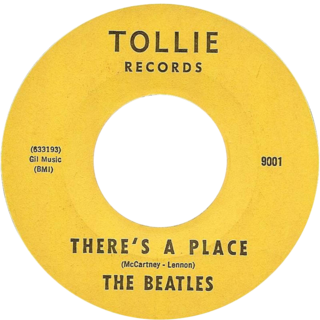
"There's a Place" is a song by the English rock band the Beatles from their debut album, Please Please Me, released in March 1963. It was written primarily by John Lennon and credited to McCartney–Lennon. In the United States, the song was released in July 1963 on the group's first US LP, Introducing... The Beatles, later reissued in January 1964 as Beatlemania surged there. It was also issued as a non-album single in the US, in March 1964, as the B-side to "Twist and Shout", reaching number 74 in the Billboard Hot 100.
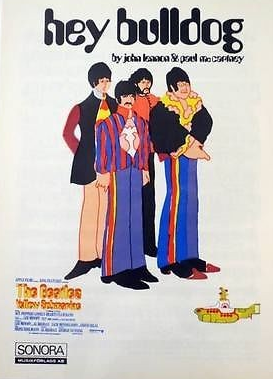
"Hey Bulldog" is a song by the English rock band the Beatles released on their 1969 soundtrack album Yellow Submarine. Credited to Lennon–McCartney, but written primarily by John Lennon, it was finished in the recording studio by both Lennon and Paul McCartney. The song was recorded during the filming of the "Lady Madonna" promotional film, and, with "Lady Madonna", is one of the few Beatles songs based on a piano riff.
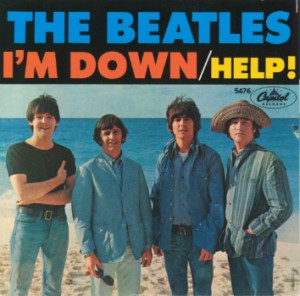
"I'm Down" is a song by the English rock band the Beatles, written by Paul McCartney and credited to Lennon–McCartney. It was released on a non-album single as the B-side to "Help!" in July 1965. The song originated in McCartney's attempt to write a song in the style of Little Richard, whose song "Long Tall Sally" the band regularly covered.
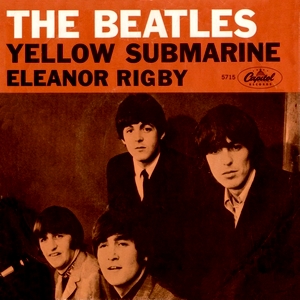
"Yellow Submarine" is a song by the English rock band the Beatles from their 1966 album Revolver. It was also issued on a double A-side single, paired with "Eleanor Rigby". Written as a children's song by Paul McCartney and John Lennon, it was drummer Ringo Starr's vocal spot on the album. The single went to number one on charts in the United Kingdom and several other European countries, and in Australia, Canada and New Zealand. It won an Ivor Novello Award for the highest certified sales of any single written by a British songwriter and issued in the UK in 1966. In the US, the song peaked at number two on the Billboard Hot 100 chart.
"If You've Got Trouble" is a song written by Lennon–McCartney and recorded by the Beatles on 18 February 1965 with Ringo Starr singing the lead vocal. The song was intended to be Starr's vocal appearance on the Help! album and the Help! film, but the Beatles were not happy with the recording and later chose to cover "Act Naturally" instead. "If You've Got Trouble" remained unreleased until Anthology 2 in 1996.
